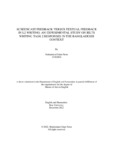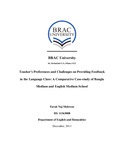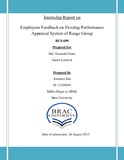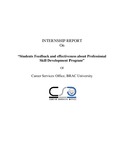| dc.contributor.advisor | Amin, Md. Al | |
| dc.contributor.author | Neon, Muhaiminul Islam | |
| dc.date.accessioned | 2023-06-13T06:31:55Z | |
| dc.date.available | 2023-06-13T06:31:55Z | |
| dc.date.copyright | 2022 | |
| dc.date.issued | 2022-12 | |
| dc.identifier.other | ID 21363016 | |
| dc.identifier.uri | http://hdl.handle.net/10361/18600 | |
| dc.description | This thesis report is submitted in partial fulfillment of the requirements for the degree of Masters of Arts in Teaching to Speakers of Other Languages, 2022. | en_US |
| dc.description | Cataloged from PDF version of thesis. | |
| dc.description | Includes bibliographical references (pages 39-48). | |
| dc.description.abstract | It has been generally established, though with controversy, that feedback serves an important purpose in developing second language learners’ writing skills. Screencast feedback is the new breed of feedback whereas the traditional mode of providing L2 writing feedback has been textual feedback. In the context of Bangladesh, there is a scarcity of research regarding screencast feedback in general, and on IELTS writing feedback in particular. Since IELTS is a charming prospect for a large proportion of Bangladeshi citizens for higher studies, there is a need to evaluate the feedback techniques IELTS test-takers experience. Thus, this study adopts a qualitative approach by conducting an experiment on Bangladeshi people who have either given IELTS or are prospective IELTS test-takers. In a four-phase research framework, participants wrote a pre- and post-feedback IELTS Writing Task 2 essay. Among the twenty-two participants, half were provided textual feedback, and half, screencast feedback. Finally, semi-structured interviews were conducted to explore their perceptions. The essays were marked using the official IELTS Writing Task 2 rubric, and thematic data analysis was used for the interview data. The experimental results revealed that both feedback modes, but especially screencast feedback led to significant score increases. The highest score increases corresponded to these rubric elements: task response and coherence and cohesion. The perceptions of the Bangladeshi IELTS test-takers were remarkably positive for screencast feedback, to the point that all screencast feedback receivers called for it to be introduced into the curriculum. | en_US |
| dc.description.statementofresponsibility | Muhaiminul Islam Neon | |
| dc.format.extent | 59 pages | |
| dc.language.iso | en | en_US |
| dc.publisher | Brac University | en_US |
| dc.rights | Brac University theses are protected by copyright. They may be viewed from this source for any purpose, but reproduction or distribution in any format is prohibited without written permission. | |
| dc.subject | Screencast feedback | en_US |
| dc.subject | Textual feedback | en_US |
| dc.subject | Written feedback | en_US |
| dc.subject | Written corrective feedback | en_US |
| dc.subject | Error correction | en_US |
| dc.subject | IELTS writing task 2 | en_US |
| dc.subject.lcsh | English language--Study and teaching--Foreign speakers. | |
| dc.subject.lcsh | English language--Study and teaching (Higher)--Foreign speakers. | |
| dc.title | Screencast feedback versus textual feedback in L2 writing: an experimental study on IELTS writing task 2 responses in the Bangladeshi context | en_US |
| dc.type | Thesis | en_US |
| dc.contributor.department | Department of English and Humanities, Brac University | |
| dc.description.degree | M. in English | |




